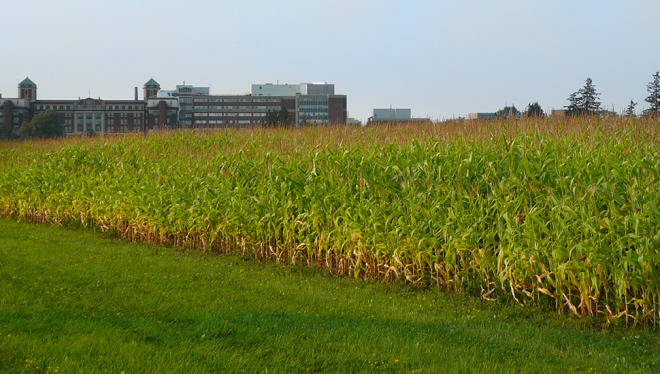Ottawa redevelopment could negatively affect agriculture research
Critics say a proposed redevelopment near Ottawa’s Central Experimental Farm will have a negative impact on the facility’s future.
Though the redevelopment would not encroach on farmland, it would replace one eight-storey building on a neighbouring lot with two others, at 16 and 27 storeys respectively. The building proposal was approved by the city’s planning and housing committee Aug. 16.
WHY IT MATTERS: The Central Experimental Farm has been a key location for Agriculture and Agri-food Canada research trials in Ontario for more than 135 years.
The proposed redevelopment is at Carling and Parkdale, on the northwestern corner of the farm. Shade from the buildings is expected to interfere with research.
“We actually have conducted and concluded a technical internal assessment on the potential impact and risk on CEF land,” said Pascal Michel, AAFC director general for the Ontario-Quebec region. “In short, we’ve done our homework on this quite thoroughly.”
The immediate concern is the shade that two high towers would cast.
“We now know that there will be a direct and meaningful impact on our ability to conduct research on the land that is affected by the shadow of those towers,” Michel said.
“There’s an amount of light in that field, which is diminished. That’s impact number one. With the amount of light being diminished, it changes also all of the soil chemistry.”
The farm aims to create a research environment that simulates a typical Canadian agricultural environment. Dealing with shade from the towers would change this significantly.
“The more meaningful impact is that we conduct experiments, right? Research experiments. To do that, we need the land to be untainted in terms of being representative of a normal agricultural land in Canada.”
Michel said the development will affect more than the small area nearby.
“I can tell you, it penetrates well into the northwest side of the CEF land. So, it is not just the border of Carling (avenue). It’s way deep,” he said. “It penetrates quite deep down into the middle of the CEF.”
The affected area is particularly valuable for research, he added.
“It’s worth noting that the soil composition of this part of the CEF is prime … we’ve got less suitable soil composition elsewhere, but this is the prime land for doing the research that we’re doing.
“That research cannot be conducted if the condition of the research is affected with uncertainties of light and stuff. The data that comes out of this will be hard to be extrapolated as being meaningful in a Canadian context.”
The work of the experimental farm dates back to 1886 and Michel said he believes the historical research asset is now at risk.
AAFC has sent a formal letter to the city of Ottawa, including a detailed technical assessment of the impact. Michel said a city councillor followed up with CEF researchers for a consultation, but negotiations have gone no further.
“We are open to discuss with citizens, with our federal partners, with the City of Ottawa, that this is not an inconvenience,” he said.
“We’re talking about agricultural land and the ability to carry out research experiments. That, I think, is a message that is sometimes not coming so clear.”
Ottawa’s Planning, Development and Construction department did not respond to a request for comment by press time.
Read this article in its entirety on Farmtario.com
